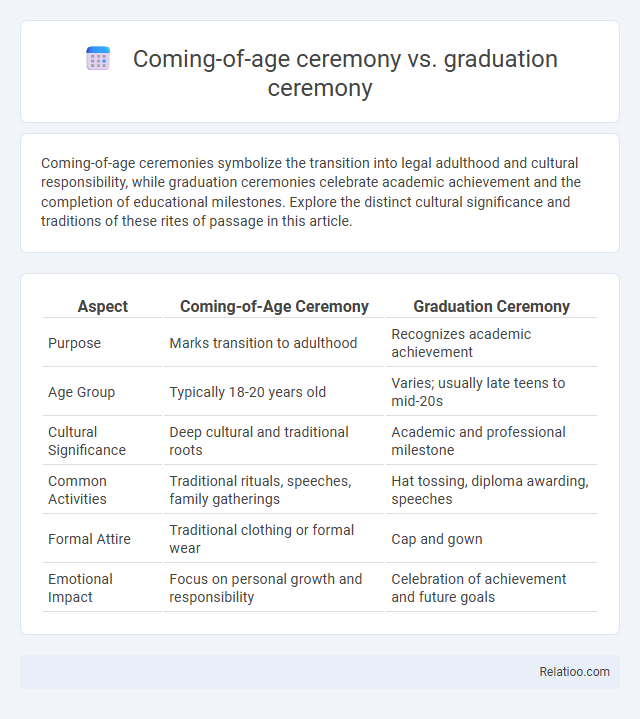Coming-of-age ceremonies symbolize the transition into legal adulthood and cultural responsibility, while graduation ceremonies celebrate academic achievement and the completion of educational milestones. Explore the distinct cultural significance and traditions of these rites of passage in this article.
Table of Comparison
| Aspect | Coming-of-Age Ceremony | Graduation Ceremony |
|---|---|---|
| Purpose | Marks transition to adulthood | Recognizes academic achievement |
| Age Group | Typically 18-20 years old | Varies; usually late teens to mid-20s |
| Cultural Significance | Deep cultural and traditional roots | Academic and professional milestone |
| Common Activities | Traditional rituals, speeches, family gatherings | Hat tossing, diploma awarding, speeches |
| Formal Attire | Traditional clothing or formal wear | Cap and gown |
| Emotional Impact | Focus on personal growth and responsibility | Celebration of achievement and future goals |
Introduction to Coming-of-Age and Graduation Ceremonies
Coming-of-age ceremonies mark a significant cultural transition where individuals are formally recognized as entering adulthood, often involving traditional rituals that emphasize personal growth and social responsibility. Graduation ceremonies celebrate the completion of an academic program, symbolizing educational achievement and the readiness to pursue further studies or professional careers. Both ceremonies serve as important rites of passage that highlight milestones in personal development and societal integration.
Historical Background of Coming-of-Age Ceremonies
Coming-of-age ceremonies have a rich historical background rooted in ancient cultures worldwide, marking the transition from childhood to adulthood with rituals that symbolize maturity and social responsibility. Unlike graduation ceremonies, which primarily celebrate academic achievement, coming-of-age rituals often include communal rites such as initiation, vision quests, or symbolic tasks that reflect cultural values. Understanding your coming-of-age ceremony connects you to these ancestral traditions, highlighting a profound cultural acknowledgment beyond the educational context of graduation or the broader concept of rites of passage.
Evolution of Graduation Ceremonies
Graduation ceremonies have evolved from traditional rites of passage that mark significant life transitions, such as coming-of-age ceremonies, to formalized academic celebrations recognizing educational achievements. Your graduation reflects both personal growth and societal acknowledgment, incorporating cultural customs that symbolize maturity and accomplishment. Over time, these ceremonies have incorporated new rituals and symbols, blending historical traditions with modern educational milestones to honor progression within a community.
Cultural Significance: Coming-of-Age vs Graduation
Coming-of-age ceremonies hold deep cultural significance as they mark a youth's transition into adulthood within specific traditions, often involving rituals that emphasize identity, responsibility, and community belonging. Graduation ceremonies symbolize academic achievement and the completion of an educational phase, celebrating personal growth and future potential in professional or academic contexts. Your understanding of these ceremonies highlights how coming-of-age focuses on cultural heritage and social roles, while graduation centers on educational milestones and career readiness.
Key Rituals and Traditions Compared
Coming-of-age ceremonies, graduation ceremonies, and rites of passage each have distinctive rituals that symbolize major life transitions; coming-of-age events often include symbolic acts like receiving a specific garment or participating in a community ceremony, while graduation ceremonies typically feature the wearing of caps and gowns, the procession, and the conferral of diplomas. Rites of passage encompass a broader range of cultural or spiritual ceremonies, such as initiation rites, vision quests, or religious sacraments, marking the movement from one social status to another. Your understanding of these traditions highlights how cultures use key rituals to recognize growth, achievement, and transformation across different life stages.
Symbolic Meaning and Societal Roles
Coming-of-age ceremonies symbolize the transition from childhood to adulthood, marking the individual's acceptance of new societal responsibilities and often reinforcing cultural identity. Graduation ceremonies represent academic achievement and personal growth, signifying the completion of an educational journey and readiness to contribute to professional or communal life. Your participation in these rites of passage reflects critical milestones that affirm social status shifts and facilitate integration into new community roles.
Emotional Impact on Participants
The emotional impact of a coming-of-age ceremony often centers on personal growth, identity affirmation, and cultural belonging, offering you a deep sense of transition into adulthood. Graduation ceremonies typically evoke pride, accomplishment, and future anticipation, highlighting educational milestones and societal recognition. Rites of passage encompass a broader range of life transitions, combining emotional intensity and communal support to mark significant changes, reinforcing your connection to tradition and community.
Family and Community Involvement
Family and community involvement plays a crucial role in coming-of-age ceremonies, often featuring traditional rituals that symbolize your transition to adulthood and reinforce cultural values. Graduation ceremonies, while primarily academic, also invite family and community members to celebrate educational achievements and support future goals. Rites of passage encompass a wider range of ceremonies where collective participation solidifies social bonds and affirms your place within the community's ongoing cultural narrative.
Modern Adaptations and Global Trends
Modern adaptations of coming-of-age ceremonies, graduation ceremonies, and rites of passage reflect evolving cultural values and increased inclusivity across global societies. You can find these events incorporating digital technology, multicultural elements, and personalized rituals designed to resonate with contemporary youth while honoring traditional significance. Global trends emphasize experiential learning and community engagement, transforming these milestones into dynamic celebrations of identity and achievement.
Conclusion: Comparing Milestones of Maturity and Achievement
Coming-of-age ceremonies, graduation ceremonies, and rites of passage each signify important milestones in your life, marking transitions from innocence to maturity or from student to graduate status. While coming-of-age ceremonies and rites of passage emphasize personal growth and cultural identity, graduation ceremonies focus on academic achievement and future opportunities. Together, these ceremonies reflect the multifaceted nature of maturity and accomplishment, highlighting both internal development and external recognition.

Infographic: Coming-of-age ceremony vs Graduation ceremony
 relatioo.com
relatioo.com